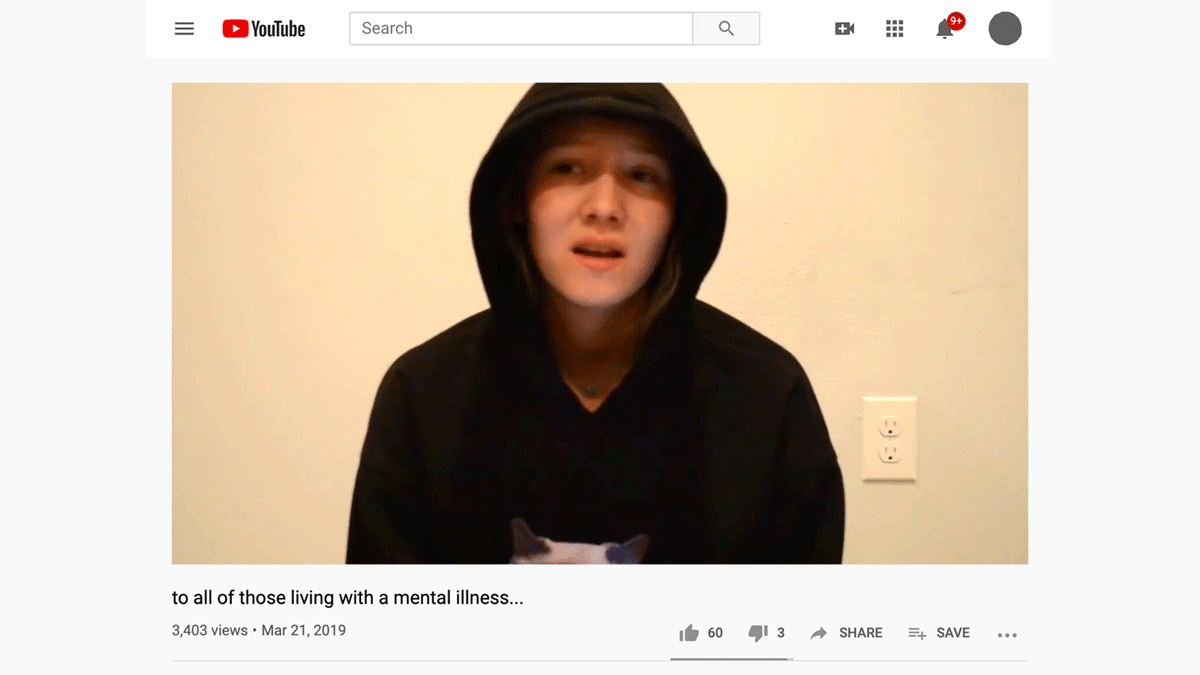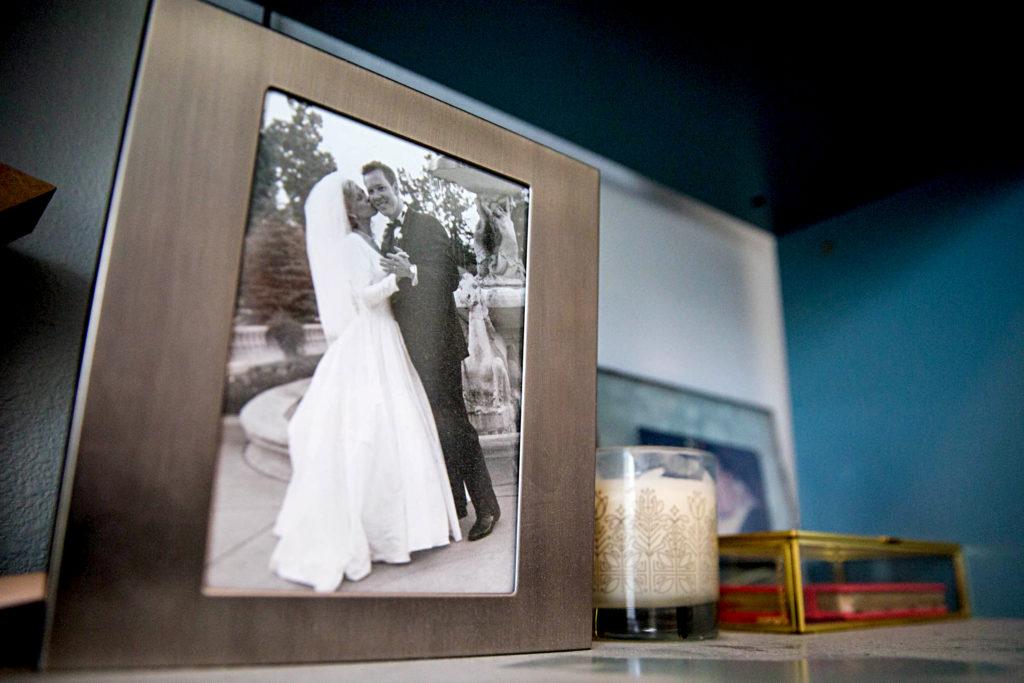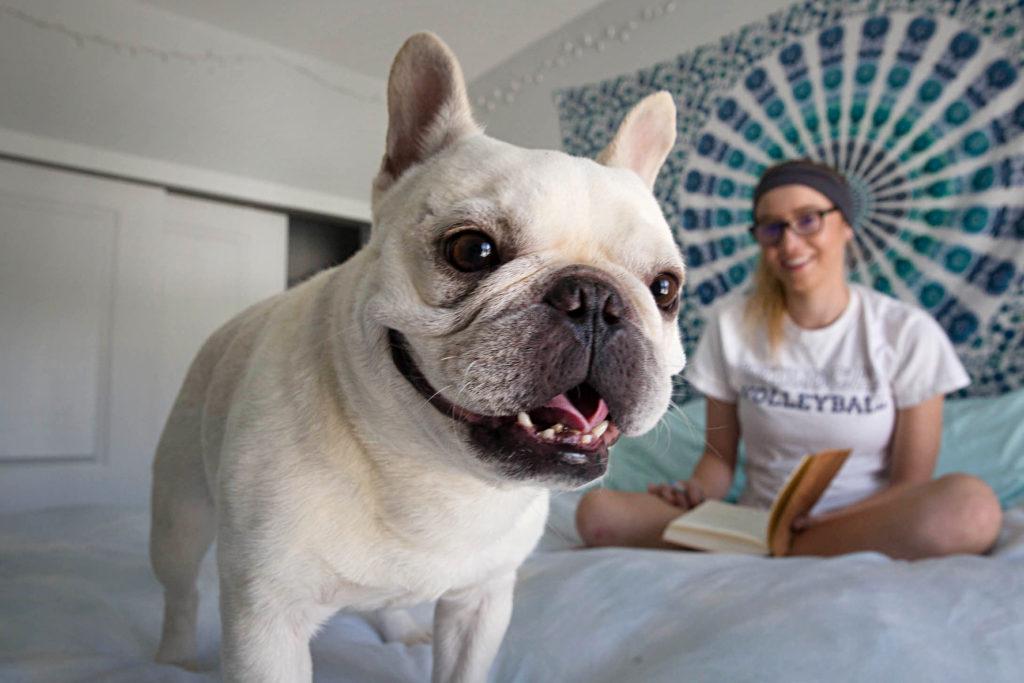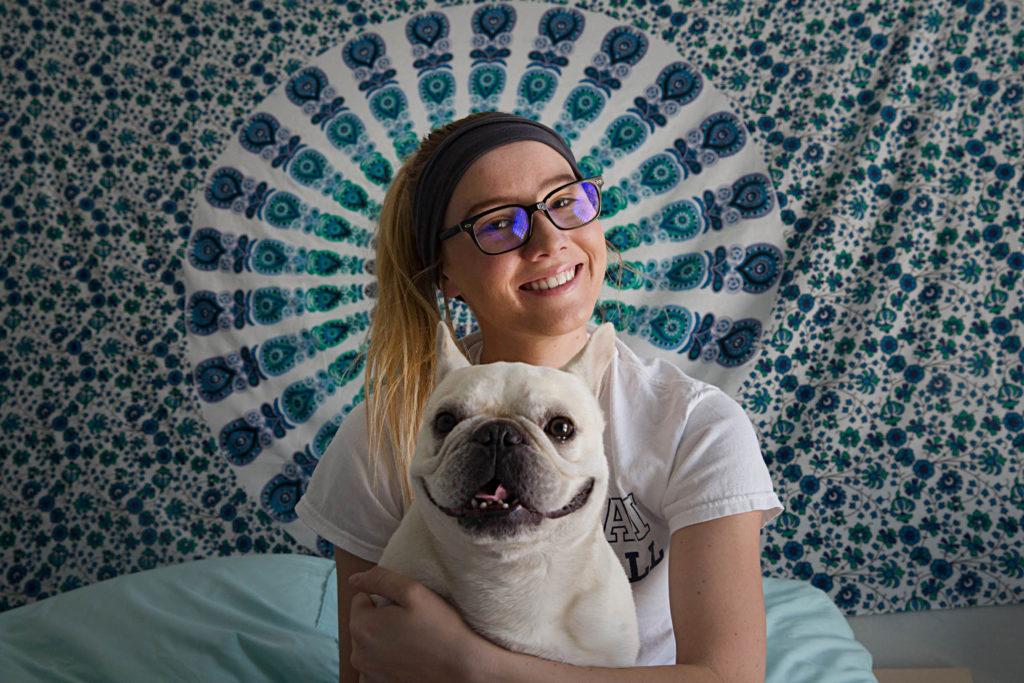
Eighteen-year-old Alex flips through journal entries in her mom’s living room in Denver. They trace a three-year period in her life, beginning in one of her blackest periods. In ink that switches from blue to green to red to pink, she documented her struggles with mental health.
“I'll look back at journal entries from a year ago and I can't even recognize the person who was writing that and I was just in such a dark place,” she says.
As a child, Alex loved her life. She, her mom and her dad were super close, the kind of family other kids liked being around. Her dad was her best friend. But by her teen years, when her dad’s business began to spiral downward, so did he, drinking heavily. He became physically and verbally abusive. Alex got so frustrated with her dad’s drinking that one day in her sophomore year in 2017, she collected all the wine bottles she found around the house.
“I collected them from every spot I could. I took all of them and I put them on his bed so that when he got home he would have a visual of what he had become,” she says.
He came home that night, drunk, and it didn’t go well. She and her mom moved out. The summer was turbulent, with her dad, inebriated, leaving her ugly phone messages. His health suffered. He fell, cracked his jaw, broke his fingers and had multiple concussions. She and her mom would take him to and from the hospital.
It was traumatizing.
"It was the most painful thing to watch someone destroy their life," Alex says.
In a couple of short months, her dad would die by suicide.
Children who lose a parent to suicide are three times more likely to die the same way. But most do not. Even as suicide rates climb, researchers say children are surprisingly resilient: with the right supports, most are able to recover.
In the fall of 2017, Alex had to go to her dad’s house as it was foreclosed on to get something. Seeing how much weight he’d lost, she made him something to eat. There were vodka bottles everywhere. She discovered he was also taking drugs. They argued and she left, blocking him on her phone.
As she walked out of the house, she remembers looking at her dad through a side window. She says he had his face in his hands and was sobbing, packed boxes surrounding him.
“That image of him on the couch will always be an image of just pure isolation and loneliness. He had no one left in his life. He had no car. He had no money. And he had no sanity,” Alex says through tears.
A week after their last conversation, her dad took his life.
Alex began sleeping all day, not moving. She’d lock herself in a dark room. That winter, as she fell into a deep depression, overwhelmed with guilt about her father’s suicide, her mom made her go outside and and she’d walk and walk. She listened to angry music, sad music. The lyrics made her feel like she wasn’t alone.
Lund, "Broken"Will you end my pain?
Will you take my life?
Will you bleed me out?
Will you hang me out to dry?
Will you take my soul in the midnight rain?
“I was just so sad. I just wanted my dad back. No one was aware of how bad I was doing when no one was at the house. I was the only one that knew.”
Eventually, Alex was diagnosed with anxiety and depression. In the year and a half after her father’s death, there were four more suicides in her life — teens she knew and one, a really close friend. Alex developed bad insomnia. She’d stay up watching videos and Snapchatting.
“I could not function. I was not sleeping and if I was sleeping, I was having really awful dreams,” she says.
She was later diagnosed with post-traumatic stress disorder, meaning she’d involuntarily relive the trauma.

Alex was overwhelmed by the past, and the future.
There have been six suicides in her life, including her grandmother’s years before.
“It was almost like a hopeless feeling of, ‘Will life ever get any better? Is anything ever going to get better or is it just going to always be this painful?’ ”
Alex pores over giant collages of pictures she’s made. One is her fun side: her friends, her dog, song lyrics, lots of pictures of her with her parents, smiling and laughing. There’s also a sad side: her friend’s suicide note, blocked voicemail messages from her dad, pictures of him in the hospital.
She takes out her dad’s journal, which she says is “a look into his mind.”
He’s energetic, compassionate, driven, with long lists of goals he wants to accomplish from learning how to handle financial pressure to playing the piano and becoming an ambassador. There is also a sense of a man struggling within himself. Alex found out that her dad had grown up in an abusive environment. So did her grandfather, part of a generational cycle of abuse, alcoholism and suicide.
That put her at high risk.
“I wanted to be able to confront my issues,” she says. “I wanted to deal with it right now because even if I'm only 18 years old, I wanted to deal with it right now because I didn't want to take that with me and eventually self-destruct or hurt the people around me like they did.”
Alex knew she had to get healthy.
She began taking medication. She started therapy specifically for PTSD.
“The talk therapy was helpful in that the person that I was talking to had no prior knowledge of anything I've been through. So any advice they're giving you is just purely unbiased and it's coming from the best place possible.”
She says it also takes away the feeling that you are burdening the people around you.
She started making life adjustments. Her coping mechanisms were journaling, working out and listening to music. At the beginning and end of every month she writes three things she’s doing well at and three things she’s doing poorly at, like whether she’s getting enough sleep or taking her medication or reaching out to people.

“Just tracking your progress throughout life because in life there's not a trophy at the end. Everyone measures success in a different way. And for me, that's how I measure my success.”
It allows her to recognize the moments of strength she has.
She writes in her journal: “I want to continue working on surrounding myself with positive influences, checking in on the people around me, show them that I care, live in the moment, do things that put me in a good mood, be less snappy.”
Acknowledging the good stuff has helped her heal faster.
“Negativity is just such a beast and it just consumes,” she says. “It doesn't do anything but consume. So writing down all the things that are good in your life can kind of clear the way that you're viewing the world.”
Like her dad, she carefully writes down all her goals in her journal: foster children, create a nonprofit for substance abuse, visit every continent. She also has a bucket list of fun things she wants to accomplish, like build a tree house, try going vegan and see a platypus.
“Wait, [platypuses] do exist, right?” she says, laughing.
It’s important to her to think about the future.
“You can be so clouded in your head, but then remembering all of the things that are out there and the things that you look forward to, it doesn't make your life seem so hopeless.”

She also has found that helping other teens is therapeutic.
She posted a few videos answering teens’ anonymous questions… like: Is it possible to recover from a mental illness? Another says: “Social media can literally make me sick to my stomach.” How can they disconnect? Another asks: How do you deal with losing someone to suicide?
She talks about feeling guilt, but then tells viewers, “If you've lost someone to suicide, I cannot stress to you enough, you couldn't have changed anything. They were sick and that was a side effect of their illness. And … the person you lost, they would want you to move on. They want you to live your life to the best.”
Perhaps the hardest question of all she gets is: How to be there for a friend is struggling with a mental illness.
“Honestly, just showing them love and support and compassion in a nonjudgmental way is really what you need to do,” she says in the video.
She tells her viewers that when she was down mostly she just wanted to get out of the house, listen to some early 2000’s throwback music and go to Taco Bell with a friend.
One teen with depression talking to another — to as many as will watch her livestream — there is a power in Alex’s words.

“You're not expected to have all the answers,” she says in the video. “You're not expected to know how to respond to everything. That's not your job. You’re not a therapist, you're just there for support. So a lot of the time just listening and being there with a person will do a lot more than you realize.”
In social media posts, she lets teens who are struggling know they are not alone:
“I changed the way I view my mental illness. I stopped seeing it as a personal weakness and embarrassment and as time went on, I began to realize that I was being affected by the societal stigma surrounding mental health. I am here to tell you: there is no shame in having a mental illness. Mental illness is not a choice....it is a disease. Having a mental illness does not make you a weak person...it can make you stronger. Talking about suicide does not encourage it...it brings awareness. So seek help and do not let an ignorant stigma stop you from receiving treatment, and ultimately living a healthy life.”
She talks about what she does when her mind “goes and goes and goes”:
“There are days where my mind goes and goes and goes; I often times get overwhelmed by my thoughts and this difficult world we live in. In those moments, I have to breathe, and remind myself that sometimes the best thing to do is to not think or obsess about life. Instead, just have faith that everything will end up the way it's supposed to. Life will go on and you will be OK.
If you are struggling. I want you to know that you are not the only one and should not go through this alone. Life can be so unfair, but the most important part of dealing with a hard time is how you overcome it. We must learn to channel our emotions into passion when we heal. Our hard times shouldn't define us. They should influence us; it is our choice to make it a positive or negative influence.”

Her main message to teens and young people struggling with mental illness, though, is your emotions don’t go away if you pretend they’re not there.
“Ultimately they're going to come back and they're going to bite you that much harder. So you might as well just confront them while you can.”
In another earlier video, Alex wears a black hoodie. It’s the day after one of her friends took her life. It’s a plea to teens to learn to live and cope with their mental illness.
“When you're in those moments where you’re so depressed, it feels like it's never going to get better. But I can promise you that those moments do pass,” she says. “You start to feel like no one cares about you anymore and no one would care if you're gone. I promise you there are so many that love and care about you.”
These days, she knows that life will be a long journey of discovering what helps her mentally. She flips through her journal looking at her favorite song lyrics that she’s scrawled down. Some remind her of her dad and that feeling about him, the feeling of being best friends, comes back.

“The feeling of just wanting him to just be there for one time,” she says. “Just one time is something that I just have to learn to live with for the rest of my life.”
But then there are other lyrics, the ones that speak the loudest in her mind, the ones that give her courage to envision a better life. And that is her ultimate goal, woven throughout her journals — in the same blue, green, red and orange ink — the goal of trying to better the world, not just for herself, but everyone around her.
Alex is now a freshman in college, and continues to give presentations on the topic of mental illness, suicide and addiction.
We want to know more, and we hope you do, too.
CPR News will spend the next few months investigating the factors that have created the ultimate pressure cooker for some teens. We’ll go into their world through audio diaries, interviews, reflection and analysis. Most importantly, we’ll examine what teens, families and schools can do to let some of the pressure loose.
_










